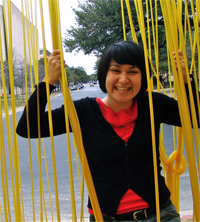
Janine Joseph is a Ph.D. student in literature and creative writing at the University of Houston. Her poems have appeared in Third Coast, Spoon River Poetry Review, and Calabash, among other journals. A Kundiman fellow, she is a recent recipient of a Brazos Bookstore/Academy of American Poets prize and a Paul & Daisy Soros Fellowship for New Americans. She holds degrees from UC Riverside and the Creative Writing Program at NYU where she taught with the Starworks Foundation and Community~Word Project. She currently teaches with Writers in the Schools and serves as a poetry editor for Gulf Coast. Born in the Philippines, she was once a child actress.
In our Process Profiles series, young contemporary Asian American poets discuss their craft, focusing on their process for a single poem from inception to publication. Here, Janine discusses her poem “Postcard,” which originally appeared in the Fall/Winter 2008 themed issue (“Making Tracks: Escape or Journey”) of Nimrod International Journal.
* * *
I first started thinking about “Postcard” when an old friend came to visit for a weekend in May of 2006. While waiting for our chicken kabob sandwiches at Mr. Falafel, I told Lucy, who had studied poetry with me in college, that I couldn’t get the image of a “soup kitchen—but not a soup kitchen” out of my head. I was fresh out of my first year in the MFA program at NYU and, with a stainless steel cup in my hand, I talked about Tupperware and a childhood memory. Lucy, being Lucy, listened and then told me what I had was a poem. What kind of a poem, I didn’t know. After lunch, we took the subway into the city and walked.
After an evening of writing in September, I brought “Soup Kitchen” into workshop. On the page, the poem was a perfectly square thing that could be cut, glued, and made to fit on a postcard. It included mysterious and humiliating phrases like “jalousie of life” in the last line. (Also, it used the color mauve.) What on earth did I mean by writing “jalousie of life”? I’m not even going to pretend I knew. What was clear by the end of my fifteen minutes of sitting silently during discussion was that the poem, according to my notes, was one part “lovely” and one part “this could go.” In class, I drew a line dividing one movement from the other.
When I worked on the poem again in January, I saw that the last five lines of the poem all had a similar impulse. They all signaled departure, but in the wrong directions. One line had the word “wind” in it, and another said “More:”. One even had the speaker “rising into / an ocean until morning.” Poor speaker. I started deleting. I took a shower. I typed “Yes,” and printed the poem out before heading to work. I folded all of the white space back so only the text was visible and carried it with me on the subway. From Brooklyn to Washington Square, I had nothing written after “Yes,”.
The last section happened like this: I lifted the phrase “jazz hands” from two other failed poems in which “jazz hands” was my only salvageable part. Walking on W 4th St. on my way back to work after my lunch break, the word “tendered” came to me. It was a sunny day. I knew I didn’t want the poem to be sad. I passed by a bagel truck. And my favorite couple grilling chicken kabobs. The title, “Postcard,” came from a poem I wrote a week after my first draft of “Soup Kitchen.” I figured that if I was wild enough to use “jalousie,” I could fit a cow in there somewhere.
Below is the published version of “Postcard.”
Postcard
Before I knocked, Ricky’s mother
would open the front door and continue
sewing in the family room while I
made it into their kitchen and lowered
my empty bucket under the running faucet
in one effortless grunt.
And then I’d be out again,
balancing the water weight on my ankle-
bone as I cut through the shared lawn,
shaking over the spikelets and spilling nothing.
In our kitchen I’d dip empty Tupperware
into the borrowed water and turn the vertical blinds
so the stalks of light would fill the brims with a broth
of similar light. While mom slept off her hunger,
dreaming we’d die and be plotted in the tile,
I sifted the morsels of stucco-ceiling reflected
bowl by bowl along the breakfast table.
Yes,
we rose one morning, vacated the house, surged
through the lawn and upturned bicycles
spinning wind in the driveway—yes.
If you ask me now, I’ll tell you
the leaves on our trees were a hundred
jazz hands, the sun a cow, or a moon,
depending on the day, the time, the tendered
sashay of this earth.
One thought on “Process Profile: Janine Joseph Discusses “Postcard””